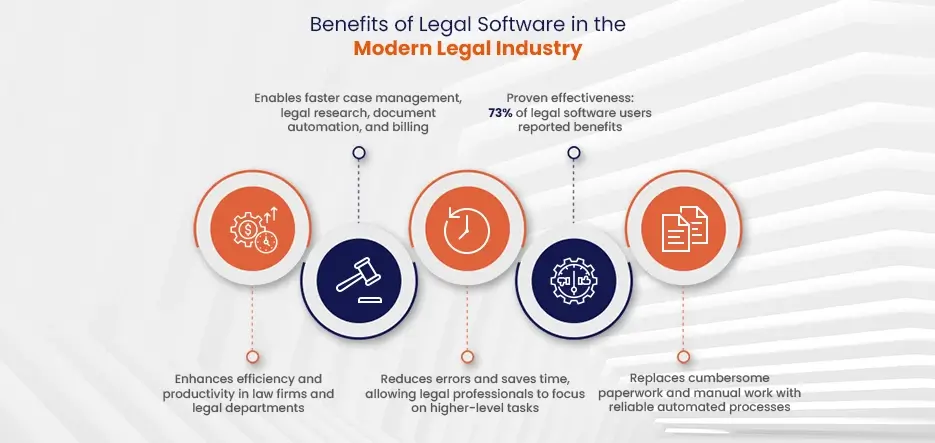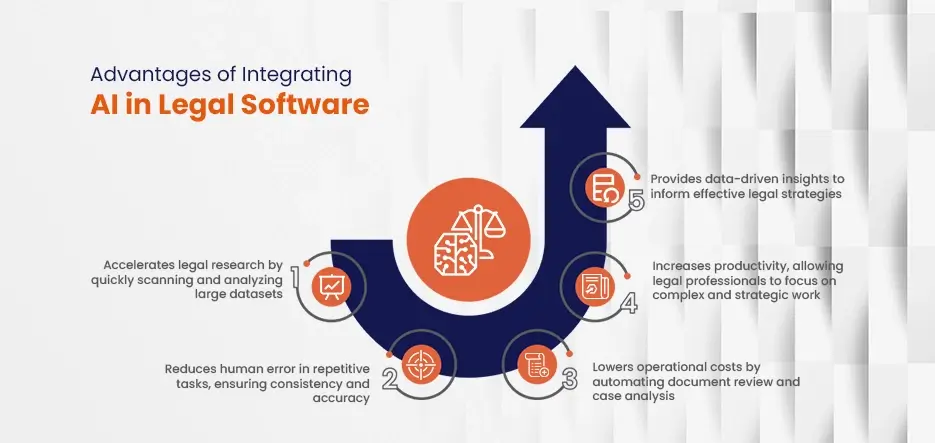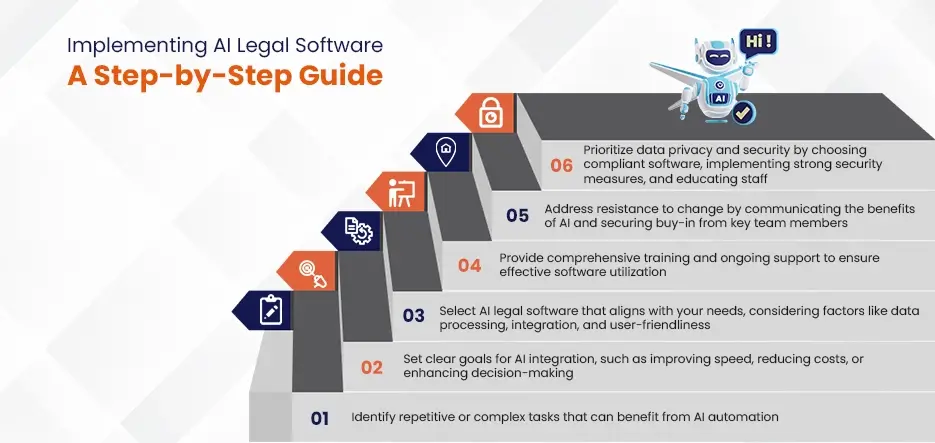Table of Contents
Legal software contains tools designed to help law firms and legal departments do their jobs better. For managing cases, doing legal research, automating documents, and billing, tools such as the need to pay attention should be given because legal software helps in faster work with reduced errors, ultimately saving time, enabling legal professionals to concentrate on higher-level work. A recent study, for instance, showed that 73% of legal software customers benefited from using the product.
The legal industry has evolved over the years, and much of this is due to new technology. Previously, there was cumbersome paperwork and manual work that used to take a lot of time and had a high chance of errors. But these jobs are much faster and more reliable with legal software now. The changes that have acted for the good of the law are predominantly due to the new tools in the market created by Legal tech companies. Nowadays, new legal software includes a host of other functions that can be automated even more with the help of functionalities like AI and machine learning.

Understanding Legal Software
Types of Legal Software
Case Management Software
Case management software helps legal experts organize their cases well. It lets users track case details, deadlines, documents, and communications in one spot. It boosts workflow and makes sure key info is easy to get. For example, firms can use these tools to plan meetings, set reminders for critical dates, and track client talks. This makes operations smoother and enhances the management of legal tasks.
Legal Research Software
Legal research software is vital for quick, thorough legal research. These tools let lawyers access a big database of case laws, statutes, legal journals, and more. Lawyers can search with keywords and get relevant results fast. This software cuts down the time needed for research so that lawyers can spend more on analysis and strategy. With advanced search features and extensive databases, legal research software is key in automating the legal industry.
Document Automation Software
Document automation software makes creating and managing legal documents easier. Legal pros can use these tools to create documents like contracts and briefs with pre-designed templates. This saves time and lowers error risks. Document automation ensures consistent, accurate legal paperwork. It’s a must-have for modern legal practices. By using document automation software, law firms can efficiently manage many documents and keep high accuracy standards.
Boost your legal practice with AI solutions from A3Logics today
Key Features of Legal Software
Data Management
Data management is crucial in legal software. Strong data management tools help law firms store, organize, and find data easily. Legal software often has robust databases for secure case-related info, client details, and documents. This makes sure data is safe and accessible when needed. Proper data management boosts legal operations’ efficiency and supports better decision-making with accurate, current info.
Workflow Automation
Workflow automation is a major feature of legal software. It streamlines repetitive tasks, reducing the workload on legal pros. With workflow automation, tasks like billing and scheduling can be automated. This lets lawyers focus on strategy. Automation in the legal industry leads to more productivity and lower operation costs. Workflow automation ensures tasks are done on time with little human help, boosting overall efficiency.
Analytical Tools
Analytical tools in legal software offer insights and support data-driven decisions. These tools analyze large data sets to find patterns and trends for legal strategies. For instance, predictive analytics can guess case results based on past data, aiding lawyers in preparation. Legal AI solutions for lawyers use these tools for deeper case insights, boosting their strategy and chance of success in cases. With advanced analytics, legal pros can make smart decisions and get better outcomes for clients.
Knowing the different types of legal software and their key features is crucial for modern legal practices. Case management, legal research, and document automation software each improve legal work efficiency and accuracy. Features like data management, workflow automation, and analytical tools help legal firms function effectively. Embracing these technologies lets legal pros streamline their work, cut costs, and boost their overall effectiveness. As the legal field evolves, using advanced legal software and AI solutions will become more critical in staying competitive.
Discover the possibilities for your legal practice with cutting-edge AI solutions from A3Logics.
The Role of AI in Legal Software
What is AI in Legal Software?
AI in legal software involves using artificial intelligence to boost the functions of legal systems. These AI solutions automate tasks, sift through large data sets, and deliver insights that sharpen decision-making. Features of legal AI software cover document review, legal research, case forecasting, and contract analysis. The main aim is to enhance efficiency, cut down on mistakes, and aid legal experts in managing complex activities.
How AI Differs from Traditional Software
Traditional legal software focuses on automating routine tasks using fixed rules and human guidance. It performs specific actions based on set instructions and has limited flexibility. In contrast, AI-powered legal software uses sophisticated algorithms and learns from data over time. It can spot patterns, adjust to new info, and predict outcomes. This capability lets AI manage more intricate and variable tasks, offering a depth of analysis and efficiency that traditional tools can’t.
Core Technologies Behind AI Legal Software
Machine Learning
Machine learning is a branch of AI that develops algorithms allowing computers to learn from data to make decisions. In legal tech, these algorithms review past case data and other important details to find trends and patterns. This is useful for forecasting outcomes, streamlining document reviews, and boosting legal research. For instance, machine learning can quickly go through thousands of documents, pinpoint key data, and highlight potential issues.
Natural Language Processing
Natural language processing (NLP) is vital in AI legal tools. NLP enables computers to understand and generate human language. This tech is key for legal research and analyzing documents as it helps the software process legal texts, pull out essential data, and even summarize texts. Legal IT services use NLP to let lawyers quickly navigate through large amounts of text and pinpoint crucial information effortlessly.
Predictive Analytics
Predictive analytics solutions applies historical data and machine learning to predict future events. In law, it can predict case outcomes using past data. This helps legal professionals evaluate their cases’ strengths and weaknesses, strategize effectively, and make well-informed choices. Predictive analytics in legal software examines elements like judge decisions, case types, and past rulings to make precise forecasts.

Benefits of Using AI in Legal Software
Efficiency and Accuracy
Speeding Up Legal Research
AI in legal software greatly speeds up legal research. Traditional research involves manually going through lots of information, which is slow and can lead to mistakes. AI-powered legal software development changes this. It quickly scans and analyzes big datasets, finding relevant cases, laws, and documents quickly. This quick processing lets legal pros get the information they need more quickly, giving them more time for strategy and client interactions.
Reducing Human Error
Another key benefit of AI in legal software is its ability to cut down on human mistakes. Manual tasks are often prone to errors from oversight, tiredness, or complexity. AI algorithms, on the other hand, can do repetitive tasks with consistent accuracy. For instance, AI can automatically check and point out errors in contracts or legal papers, making sure every detail is correct. This lowers the risk of costly legal errors and improves the quality of legal work.
Cost-Effectiveness
Lowering Operational Costs
Using AI in legal software helps reduce operational costs. Legal tasks that needed a lot of human effort, like document review and case analysis, can now be automated. This automation means less need for a big staff and less time to finish these tasks. As a result, law firms can save money by putting resources into other important areas like client services and business growth.
Increasing Productivity
Developing AI-powered legal software boosts productivity in legal practices. With AI taking care of routine and time-consuming tasks, legal professionals can focus on more complex and strategic work. This shift not only raises individual productivity but also makes the legal team more efficient overall. AI tools also help manage workloads better, making sure tasks are sorted and deadlines are met, which adds to productivity.
Enhanced Decision Making
Data-Driven Insights
A primary thing that AI provides crucially to legal software is insights backed by data. AI can scan through copious data quicker than humans to highlight patterns and trends that human analysts may have missed. Although the effect will always depend on many factors, we think it is important to understand how they are working and what the common denominators are of their work, as this should guide most legal strategies. For example, AI can study past case results to find what led to success or failure, giving valuable advice for future cases.
Predictive Case Outcomes
AI-powered legal software also improves decision-making with predictive analytics. This tech uses past data to guess the likely outcomes of legal cases. Lawyers can use these predictions to check the strengths and weaknesses of their cases, make better strategies, and give more accurate advice to clients. Predictive case outcomes help legal pros make informed choices, reducing uncertainty and boosting the chances of good results.
AI in legal software brings many benefits that greatly improve the efficiency, accuracy, cost-effectiveness, and decision-making in legal practices. Speeding up research and reducing errors boosts the quality and reliability of legal work. Cutting costs and raising productivity lets firms work more smoothly. Insights from data and predictions about cases provide strong support for making strategic decisions.
Predicting Legal Case Outcomes with AI
How AI Predicts Legal Outcomes
Data Collection and Analysis
AI in the legal processing industry is nothing but generating, gathering, and making predictions based on data. Like legal research services, AI, part of other legal software solutions, gathers data from hundreds of sources, such as the dockets in past cases, documents and opinions from courts, and social media posts. It stores and organizes this data in a way that allows for fast retrieval, giving the software a clean database to analyze.
Following the data collection, AI algorithms are used to identify patterns and relationships in the data. For instance, AI can analyze previous cases to learn what factors are responsible for their outcomes (like the arguments, judgments, or how the evidence was) This rather detailed analysis often reveals the subtle trends that we, human analysts, may not be quick to pick up on. This latter information helps to predict how similar cases will be decided in the future.
The data gathering and analysis process in AI-powered legal software is both thorough and ongoing. As new cases enter the system, the AI updates its database and refines its predictions, ensuring the insights remain relevant and accurate.
Algorithms and Models Used
The algorithms and models in AI legal software aim to replicate human reasoning but are faster and more accurate. Machine learning forms the basis of these algorithms, which improve their predictions as they process more data.
One typical algorithm used in predicting legal outcomes is the classification algorithm. This algorithm sorts cases based on characteristics and predicts outcomes accordingly. For example, it might label cases as “likely to win” or “likely to lose” based on historical data.
Another vital algorithm is the natural language processing (NLP) model. NLP enables AI to understand and interpret legal texts, which is crucial for analyzing legal documents, extracting important information, and pinpointing key arguments. NLP models can swiftly process thousands of pages of legal text, providing insights much faster than humanly possible.
Predictive analytics also plays a key role in AI legal software. These models use statistical methods to predict future events. In the legal field, they assess the likelihood of various outcomes based on past data, such as estimating if a case will be dismissed or go to trial.
These AI models are continuously tested and refined to ensure their accuracy. Legal experts and data scientists collaborate to enhance these models, adding new data and boosting their predictive power. This teamwork ensures AI remains a dependable tool for forecasting legal outcomes.
Adopting AI in the legal industry is crucial for maintaining competitiveness and providing high-quality legal services. As technology progresses, its role in legal software will only grow, driving further innovation and efficiency in legal practices.
Implementing AI in Legal Practices
Steps to Integrate AI Legal Software

Identifying Needs and Goals
First, identify what your legal practice needs from AI legal software. Look at your current tasks. Focus on repetitive or complex tasks. Common areas include reviewing documents, researching legal issues, and predicting case results. Set clear goals for using AI. You might want better speed, lower costs, or smarter decision-making.
Choosing the Right Software
Next, pick the right AI legal software. The market offers different AI tools for various legal jobs. Choose software that fits your needs. Look at how well it processes data, how easy it is to integrate, and how simple it is to use. Consider the vendor’s reputation and customer support. Read reviews and try demos before deciding.
Training and Onboarding
After choosing your software, train your team well. Everyone should know how to use the software effectively. Training should cover how to operate the software, understand its outputs, and apply it daily. Provide ongoing support to help your team as they learn.
Challenges and Solutions
Overcoming Resistance to Change
Changing to new technology can be tough. Some staff may prefer the old ways. Explain the benefits of AI clearly. Show how it simplifies work, reduces errors, and saves time. Get buy-in from key team members early. Share successes to build trust and acceptance.
Ensuring Data Privacy and Security
Handling sensitive information safely is crucial. Choose AI tools that follow strict data protection laws. Use strong security measures like encryption and access controls. Regularly check your security practices. Teach your team about keeping data safe.
Ethical Considerations
AI Bias and Fairness
Identifying and Mitigating Bias
In creating and using legal artificial intelligence software, it’s vital to identify and reduce bias. AI bias can come from the data used in training. If this data includes historical biases or inequalities, the AI may continue these unfair patterns in its outputs. For example, if old legal data shows bias against a specific group, the AI might also unfairly predict worse outcomes for similar cases in that group today.
To spot bias, developers need to check both the training data and the AI models thoroughly. Using methods like fairness-aware machine learning helps find biases. Once found, solutions include adjusting the training data, applying fairness constraints to algorithms, and regularly adding new, fair data. These steps ensure the legal software works fairly and ethically.
Ensuring Ethical AI Practices
Ethical AI requires transparency, accountability, and ongoing checks. Developers should clearly record where their data comes from, how the AI makes decisions, and any assumptions they made while building it. This openness lets everyone understand the AI’s decisions.
Accountability means setting clear rules about who is responsible for the AI’s actions. This includes plans for fixing any mistakes or unethical results from the AI. Constant monitoring means regularly checking how the AI performs and adjusting it to keep up with ethical standards. This ensures the AI stays ethical over time.
Regulatory Compliance
Understanding Legal Regulations
Legal software, especially AI-driven types, must follow legal rules to protect client data and guarantee fairness. The first step is knowing these rules. Laws like Europe’s General Data Protection Regulation (GDPR) and the California Consumer Privacy Act (CCPA) in the US set strict privacy and security standards. These laws demand transparent, secure, and legitimate handling of personal data.
AI developers in the legal field must know these laws well and make sure their software complies with them. This includes using strong security like encryption and access controls to protect sensitive data. Legal AI systems should also let people view, modify, or delete their data as allowed by law.
Adhering to Compliance Standards
Meeting compliance standards means embedding these legal requirements into the development and operation of AI software. Regular compliance checks, done internally and by third parties, are essential to confirm the software meets all legal standards. These reviews should examine how data is handled, how secure it is, and how the AI decides.
Staying current with legal changes is also crucial. As new laws appear, AI developers need to update their practices. Continual legal awareness helps keep the software compliant and legally safe. Training staff on these compliance and ethical standards is also key, ensuring everyone involved understands their duties.
Conclusion
AI has changed the legal field a lot. It offers many benefits that make work smoother and lead to better results. The main perks include higher efficiency and accuracy, cost savings, and smarter decision-making. AI in legal software speeds up research, cuts mistakes, lowers costs, and boosts productivity. It also offers insights based on data and predicts outcomes of cases, helping legal pros make informed choices. These improvements not only better the quality of legal services but also let firms use their resources more wisely.
Using AI in legal software is key for today’s legal practices. AI tools take care of everyday tasks, freeing lawyers to focus on the more complex parts of their jobs. This change increases efficiency and makes work more satisfying by lessening the load of repetitive tasks. Also, AI helps lawyers build stronger strategies and achieve more wins. Adopting AI is vital for staying ahead in the quick-paced legal world.
The outlook for legal software is promising, with AI continuing to advance. Upcoming trends like AI working with blockchain and advanced analytics will boost legal software even more. These techs will automate more tasks, provide deeper insights, and make legal processes more transparent and secure.
Transform your legal operations with A3Logics’ cutting-edge AI tools
FAQs
What is legal software?
Legal software helps manage legal tasks, from case management to document automation.
How does AI predict legal case outcomes?
AI analyses data and uses algorithms to forecast possible results.
What challenges might arise with AI in legal practices?
Challenges include resistance to change and ensuring data security.
How can law firms implement AI legal software?
By identifying needs, choosing the right software, and training staff.
Is AI legal software compliant with regulations?
Yes, but firms must ensure adherence to legal standards and data privacy.
What future trends are expected in AI legal software?
Integration with blockchain and advanced predictive analytics are emerging trends.






